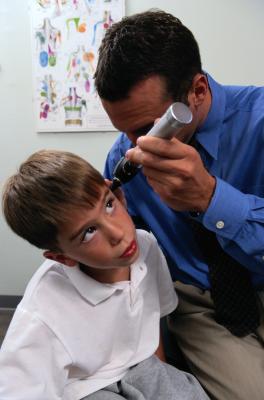A child who suffers from recurrent or chronic ear infections has fluid or infection behind the eardrums that either doesn’t go away or keeps coming back. Chronic ear infections are generally diagnosed if a child has had at least three ear infections within six months time or four ear infections within the span of a year, in which case your pediatrician will refer your child to an ENT specialist.
Symptoms
Most ear infections occur after a child has had a cold or upper respiratory infection. Some children with ear infections run a fever, although fever is not always present. According to childcare expert Dr. William Sears, kids with ear infections can be fussy and may not sleep well. Some children don’t want to lie flat to sleep when they have an ear infection. Other symptoms may include irritability, runny nose, loss of appetite, vomiting and diarrhea or puss draining from the ear. A child who has an ear infection can suffer two or more of these symptoms.
Causes
As indicated by MayoClinic.com, ear infections are caused by bacteria or viruses in the middle ear. A cold, upper respiratory infection, flu or allergy cause inflammation and swelling in the Eustachian tubes. When the tubes become blocked, fluid begins to accumulate in the middle ear. Because a child’s Eustachian tubes are narrower, this makes it more difficult for the tubes to drain. Ear infections occur more frequently in children as a result. Children also have larger adenoids which can block the Eustachian tubes.
Usual Treatment
Although some ear infections get better on their own, your child’s pediatrician may prescribe oral antibiotics to treat a recurrent ear infection. Sears points out that a course of amoxicillin is usually the standard treatment doctors try first. When there is a hole in the eardrum, antibiotics in the form of ear drops are prescribed as well. These also contain hydrocortisone, which helps the ear canal to heal. The pain associated with an ear infection can be treated with acetaminophen or ibuprofen. Follow the instructions on the bottle carefully when giving your child over-the-counter pain relievers. Applying a warm compress to the ear can also help your child to feel better.
Aggressive Treatment
More aggressive treatment may be needed for recurrent ear infections, as in some cases, a child might not respond well to traditional treatments. One option is to give your child a daily dose of antibiotics any time he shows signs of a cold. Your child should take the antibiotics for seven to 10 days. Although opinions are mixed, some doctors recommend that ear tubes be placed in your child’s ears for six months or more. The tubes drain excess fluid from the eardrums, especially when a child has a cold. In certain cases, a surgeon may need to clean out tissue that has accumulated in the ear. Other surgeries are sometimes required in the most severe cases when a child has suffered damage to the ear caused by the infections.
Prevention
Several steps can be taken to try to prevent your child’s ear infections from recurring. If your child has problems with allergies, work with your child’s doctor on ways to control the allergies. Don’t expose your child to cigarette smoke as secondhand smoke tends to make children more vulnerable to ear infections. Another preventive measure is to sit your baby up during feedings so that milk does not run down into her ears. Consider placing your child in a smaller daycare or a home daycare center if she has recurrent ear infections so that she is exposed to fewer cold viruses and germs.
Other Considerations
Following a middle ear infection, it can take up to three months for the fluid behind your child’s eardrum to clear. During that time, fluid could cause your child to experience temporary hearing loss. Effusions are different from ear infections in that a child suffers no symptoms other than fluid build up. Your pediatrician will check your child’s ears every few weeks until all the fluid goes away.
Risks
The fluid and bacteria from recurrent ear infections that do not clear can cause permanent damage to the ear and bones of the middle ear. In some cases, a child may experience hearing loss as a result. Other complications that recurrent ear infections can cause include problems with balance, facial paralysis or slow language development.





